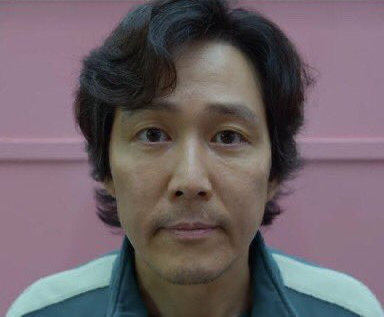Squid Game Review

Seong Gi-hun, the main character of Squid Game. ©Netflix 2021, All Rights Reserved.
March 15, 2022
Disclaimer: The spoilers in this article are all fake.
Squid Game is a somewhat recently released television series on Netflix. It follows Seong (pronounced more or less like “sung”) Gi-hun, a divorced gambling addict who has amassed a substantial amount of debt, along with 455 other similarly indebted contestants who all sign up to compete in a series of deadly games to win the prize of 45.6 billion South Korean won (worth 38 million dollars or 33 million euros at the time of broadcast). After its release on Netflix, it became immensely popular around the world, becoming the top-viewed program in 94 countries. The show led many people to learn more about social and economic issues in South Korea and turned several Korean actors into global celebrities. And somewhat humorously, the show’s success led to a huge resurgence in the popularity of traditional Korean dalgona cookies, which were previously fading out of popularity.
The show has been praised for its symbolic and literal critiques of Korean society and capitalism. On the other hand, some have criticized the director for his negatively biased portrayal of capitalism, as the show is partially based on his own, earlier economic struggles under a right-wing dictatorship (until the latter half of the 80s, South Korea was an authoritarian state).
Regardless of whether one appreciates the social commentary in Squid Game, it is still a very entertaining show and I recommend it to anyone who isn’t too disturbed by violence and gore. Additionally, a lot of background characters and several main characters die in the show, so those who don’t like tragic films and shows may want to stay away from this one.
Overall, I enjoyed the show and look forward to the next season. The plot was fairly well-written and there were several well-placed twists that enhanced it. The character development and world-building were also very well done. In the beginning, we see one of the characters start out as a normal man who looks out for his friends and tries to save them from peril. But as the games progress, he realizes that he must give up empathy and prioritize self-preservation if he wants to survive and fix his dire financial circumstances. Other background characters also go through the same mental journey and are forced to become ruthless in order to survive. This is exemplified when an informal free-for-all round begins and nearly every player tries to kill each other in order to eliminate competition. As for world-building, the characters’ stories are gradually revealed and offer insight into why they joined the games. Being half Korean myself, as well as someone with a strong interest in history, I also appreciated the subtle symbolism related to Korean history. I was very disappointed when SungWon Cho from BTS got merked in episode 7. He had a lot of potential and should’ve survived. Hong Sa-ik’s death was also pretty sad.


Mateo Krok • Apr 15, 2022 at 3:06 pm
amen brotha